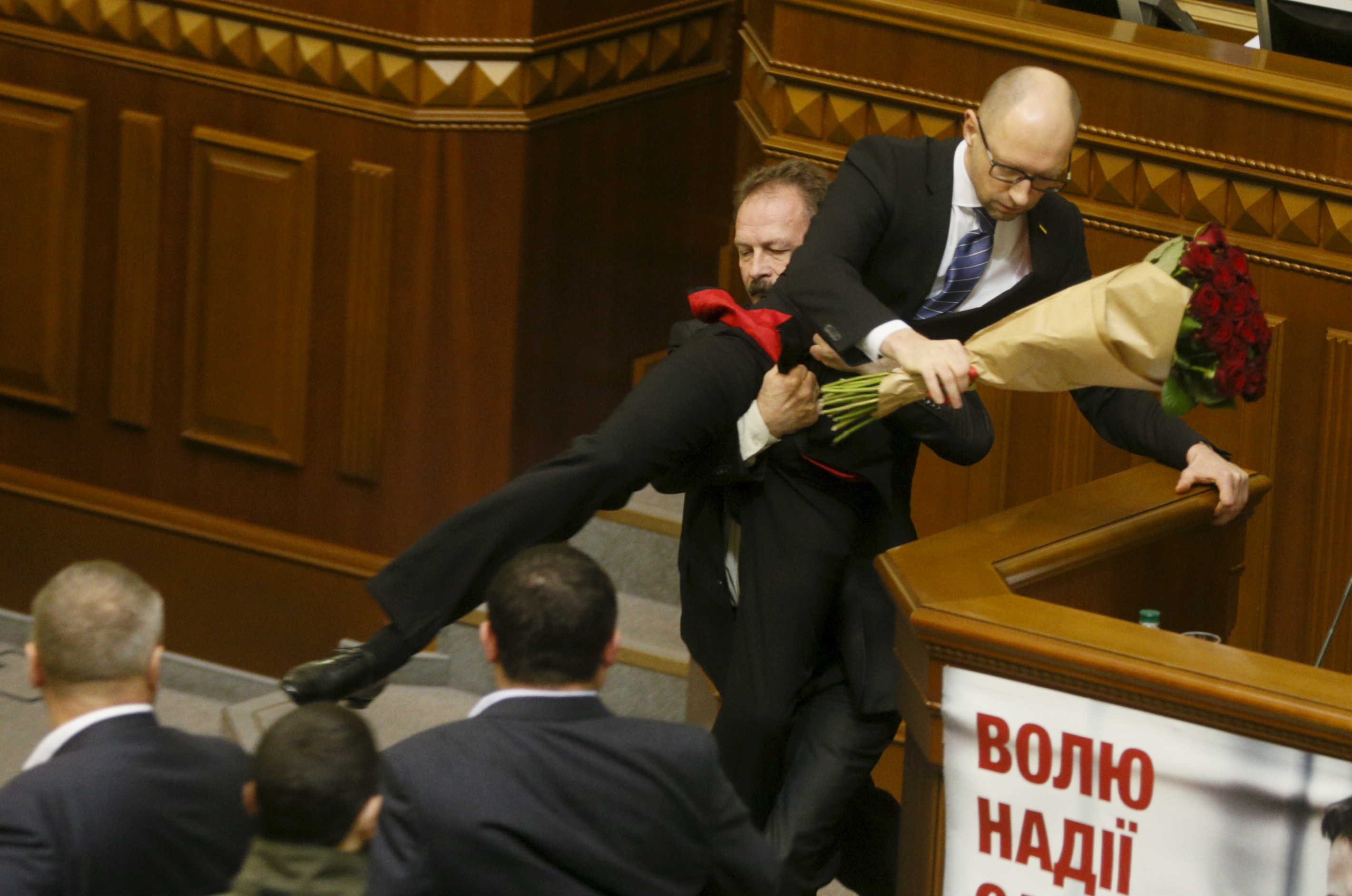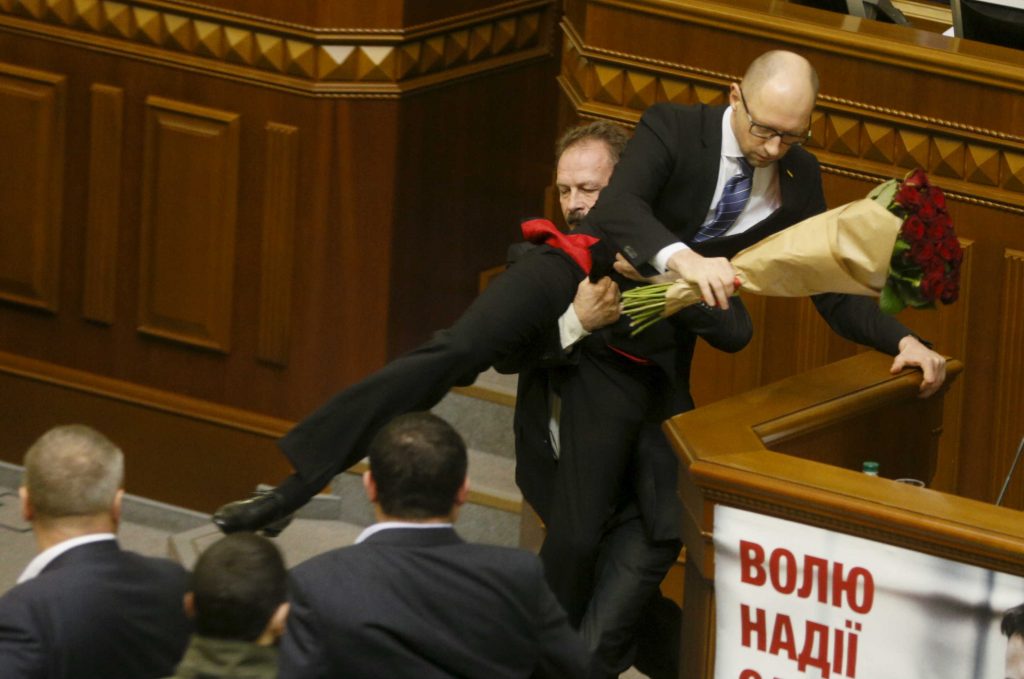 Whoever directed the show in Ukraine’s parliament on December 11—when a ruling-party coalition parliamentarian dragged Prime Minister Arseniy Yatsenyuk from the podium—may have achieved their objective: there was no serious discussion of the government’s record that day. As a result of internal and external compromises, the current government with Yatsenyuk will remain in place for the time being until the next spectacle.
Whoever directed the show in Ukraine’s parliament on December 11—when a ruling-party coalition parliamentarian dragged Prime Minister Arseniy Yatsenyuk from the podium—may have achieved their objective: there was no serious discussion of the government’s record that day. As a result of internal and external compromises, the current government with Yatsenyuk will remain in place for the time being until the next spectacle.
Compromise is the way Ukraine developed—or misdeveloped—during the last twenty-five years. Unlike Central Europe and the Baltics, where little or no compromise was made with its communist past, independent Ukraine was reborn as a compromise between pro-independence democrats and communists in 1991. The essence of the compromise was about leaving the Soviet Union, but largely keeping the old Soviet bureaucracy in place, which consists not only of people, but primarily of obsolete structures and processes. That is why, for example, the Ministry of Economy in 2014 still resembled the Soviet planning agency Gosplan, the Soviet price-setting agency Goskomtsen, and the Soviet committee for setting product quality Gosstandart. Government processes are largely paper-based, despite Ukraine’s success in the IT industry. And many people still come from the old era at least mentally, if not physically.
President Leonid Kuchma gave up Ukraine’s nuclear weapons in exchange for the Budapest Memorandum, which assured (or as Ukrainians now say “guaranteed”) Ukraine’s territorial integrity. Kuchma constantly compromised between Russia and the West under the auspices of his multi-vector foreign policy. A year after the Orange Revolution, President Viktor Yushchenko ousted Prime Minister Yulia Tymoshenko and then compromised with his arch-rival Viktor Yanukovych, who continued to play the West against Russia for his own benefit.
The victory of the Euromaidan was the right time to end this self-defeating practice of too much compromise, but instead the practice endures. Ukraine’s 2015 reforms are a compromise between the demands of the West and the ruling elite’s business interests. Sick of these compromises, the reform-minded Transportation and Infrastructure Minister announced his resignation December 11.
The 2016 budget and the tax code, submitted by the government to the parliament last week is the result of, well, compromise. The Ministry of Finance, supported by the International Monetary Fund and foreign experts, insisted on a uniform 20 percent for the value-added tax (VAT) and taxes on income and corporate profits, and a unified social tax. The parliamentary committee, led by a parliamentarian from the President’s party, called for much lower taxes to legalize a huge shadow economy and spur economic growth. A reasonable suggestion to correspondingly cut government expenditures was left out.
But the shadow economy in Ukraine is large not only because of a high unified social tax, but primarily because of overregulation, an opaque tax administration, the brutal attitude of the fiscal authorities, and a corrupt judicial system. For a national budget, the best solution would be to step up deregulation, reform the tax service and administration, and clean up the court system. Lowering taxes while leaving the system as is may lead to lower government revenues and a larger deficit. This is a less than ideal solution. After heated discussions, a compromise was reached with a 20 percent VAT and unified social tax and an 18 percent income and corporate tax.
The lack of strong, ideological parties contributes to Ukraine’s culture of too much compromise. Petro Poroshenko’s Bloc and Yatsenyuk’s Popular Front were created largely to support their leaders’ ambitions. Tymoshenko’s Batkivshchyna and Oleh Liashko’s Radicals are not much different but with a populist twist. Only Samopomich has some elements of ideology, but even this party has huge tensions between its liberal and conservative wings.
For the time being, the minimum number of reforms to ensure Western support and keep society, which is heating up, from exploding and starting another Maidan, will be enacted. We shouldn’t expect any more. Civil society with the West’s support must stay involved and vigilant.
Civil society knows that politics centers on the art of compromise, but it is no longer willing to compromise with a compromise. The bravest Ukrainian civic leaders paid the highest possible price for freedom and dignity, laying their lives. Uncompromisingly.
Pavlo Sheremeta is director of the Ukrainian Catholic University’s School of Public Management and a former Minister of Economic Development and Trade.
Image: Rada deputy Oleg Barna removes Prime Minister Arseny Yatseniuk from the podium, after presenting him a bouquet of roses, during the parliament session in Kyiv, Ukraine, December 11, 2015. Credit: REUTERS/Valentyn Ogirenko
